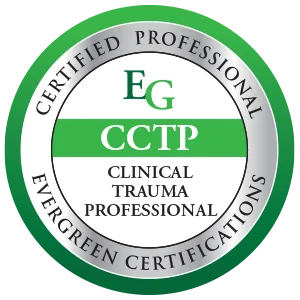Insurance Accepted:
United Healthcare, Blue Cross Blue Shield, Aetna,
Cigna, Oscar, Oxford, Carelon, Quest Behavioral Health,
Anthem EAP, and Curalinc EAP.
Accepting only clients residing in Arizona, Oregon, or Florida
Have I experienced Trauma?
I’ve heard many clients say “it wasn’t that big of a deal” or “other people have it worse” when discussing past traumatic events. You don’t have to be in combat to develop symptoms of trauma. The truth is you can be traumatized by almost anything under the right conditions. Trauma occurs when an individual experiences something that continues to negatively affect their emotions for years to come. To compare your trauma to another person is not helpful. If something traumatic happened to you (or you witnessed something traumatic happen to someone else) and you are experiencing reoccuring emotional pain, you may be struggling with symptoms of trauma. The good news is there are highly effective treatments for trauma and PTSD including EMDR, Acceptance and Commitment Therapy (ACT) and Dialectal Behavior Therapy (DBT). There is a light at the end of the tunnel – don’t give up!
An estimated 60% of men and 50% of women experience at least one trauma in their lives
Common Causes of Trauma:
- Violence
- Death
- Sexual Assault
- Divorce
- Childhood Neglect
- Relationship Troubles
- Bullying
- Alienation
- Domestic Violence
- Rejection
- Car Accident
- Severe Health Issues or Injuries
- Traumatic Events at Work
- Child Birth Trauma
- Natural Disaster
- Military Conflict
- First Responder
Symptoms of Trauma:
- Intrusive Thoughts
- Hypervigilance
- Recurring distressing memories
- Avoidance of certain triggers
- Nightmares
- Recurring distressing memories
- Flashbacks
- Emotional reactivity to certain related events
- Negative Mood
- Dissociation (feeling disconnected from yourself)
- Chronic negative attitude
- Self-blame
- Unprovoked irritability
- Self-destructive behaviors
- Heightened startle response
- Difficulty concentrating
- Disrupted sleep patterns
One study showed up to 90% of single-trauma victims no longer have PTSD after only three sessions of EMDR.

Therapy Services
Convenient Telehealth Video therapy for trauma, PTSD, depression, anxiety, addiction, and more for clients residing in Arizona, Oregon, and Florida
EMDR + Polyvagal Therapy for PTSD
Eye Movement Desensitization and Reprocessing (EMDR) therapy is used to treat symptoms related to trauma. EMDR allows your nervous system to process past traumatic events in a healthier way which fosters acceptance and emotional stability.
Learn more about EMDR telehealth therapy
Polyvagal Theory helps us understand the mechanics of our nervous system and optimize our regulation of emotions during intense situations.
Learn more about Polyvagal Theory
Healing Attachment Wounds
Attachment Theory helps us understand the way our nervous systems have adapted to hold space for connection with others. Our attachment systems can grow and adapt to allow us to be more emotionally consistent and resilient.
Learn more
Accepting our struggles so we can push back on them
Acceptance and Commitment Therapy (ACT) can be used to treat many mental health struggles. ACT helps us adapt to difficult life situations and build psychological flexibility. Learning to accept that which we cannot change can free us up to address other needs.
Learn more
Take a Big Step Forward. Reach out today.


Take the first step toward feeling better. Call today!
Insurance Accepted:
United Healthcare, Blue Cross Blue Shield, Aetna,
Cigna, Oscar, Oxford, Carelon, Quest Behavioral Health,
Anthem EAP, and Curalinc EAP.
News Feed
Astra Counseling: Attachment Theory and Polyvagal Theory in Practice
Astra Counseling: Attachment Theory and Polyvagal Theory in Practice At Astra Counseling, we specialize in understanding and treating trauma-related disorders....
Read MoreFighting the toxic shame that comes from trauma
Shame, an insidious companion to trauma and post-traumatic stress disorder (PTSD), weaves its corrosive threads into the very fabric of...
Read MoreUnderstanding the freeze/fawn trauma response
In the intricate tapestry of trauma responses, the often overlooked but profoundly impactful freeze/fawn response takes center stage. This article...
Read More